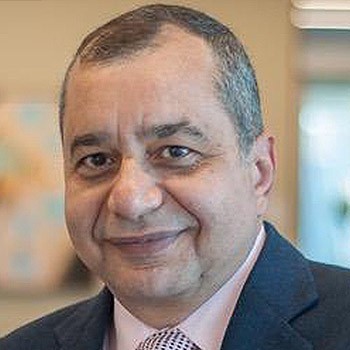Over the past 25 years, Dr. Amr Soliman has been collaborating with faculty in various global settings and minority populations in the U.S. to develop a program in cancer epidemiology and translation to cancer prevention and control in special populations. This collaboration has led to a developing and maintaining strong research infrastructure in global settings and with several medical centers in Africa, Asia, Latin America, and Eastern Europe to investigate the epidemiology of cancers relevant to the local sites. Dr. Soliman has led the largest global study for inflammatory breast cancer (IBC) research in North Africa and a large NIH U54 Program project in Tanzania for HIV-related malignancies. The two global studies are major components of his research that provide significant research and training opportunities.
Over the past 20 years, Dr. Soliman has served as the Principal Investigator of the NCI-R25 supported Cancer Epidemiology Education in Special Populations (CEESP) Program at the University of Michigan, University of Nebraska, and City University of New York (CUNY). The CEESP Program has trained over 350 public health the medical students in special populations. In collaboration with leaders of cancer centers and medical schools in the U.S., Africa, and the Middle East, Dr. Soliman has led the International Cancer Prevention Consortium (ICPC). The consortium is a public-private partnership that aims at designing and implementing cancer and NCD prevention research and interventions and capacity building in low- and middle-income countries and minority populations in the U.S.
Dr. Soliman has also conducted collaborative research with the minority-focused SEER registry in Detroit, the Michigan Cancer Consortium, the State Cancer Registry of Michigan, and the Arab American Center for Social and Economic Services. Dr. Soliman has conducted several research studies focused on minority and underserved populations in Michigan, Nebraska, and New York. He has also established research studies with the African and Asian refugees and offered mentoring to trainees from minority and underserved populations. Dr. Soliman’s domestic research in the U.S. includes studies focused on access to cancer care, screening, and early detection in minority and underserved populations.
Dr. Soliman developed and taught courses on "Introduction to Cancer Epidemiology", "Field Methods for Epidemiology in Developing Countries", "Cancer Epidemiology in Special Populations", "Topics in Cancer Control and Prevention”, “Translational Medicine”, and “Epidemiology in Medical Sciences”. Dr. Soliman is Past President of the American Association for Cancer Education (AACE) and the current Editor-in-Chief of the Journal of Cancer Education.
The Gharbia Cancer Society was one of the main sites of the inflammatory breast cancer study in North Africa that was funded by the NCI. The leaders of the Gharbia Cancer Society were instrumental in developing and executing the IBC study in Egypt. The team of the Ghariba Cancer Society also trained more than 43 CEESP students and all of them published joint papers on the epidemiology, management, and cancer prevention of cancer.
 English
English
 العربية
العربية

